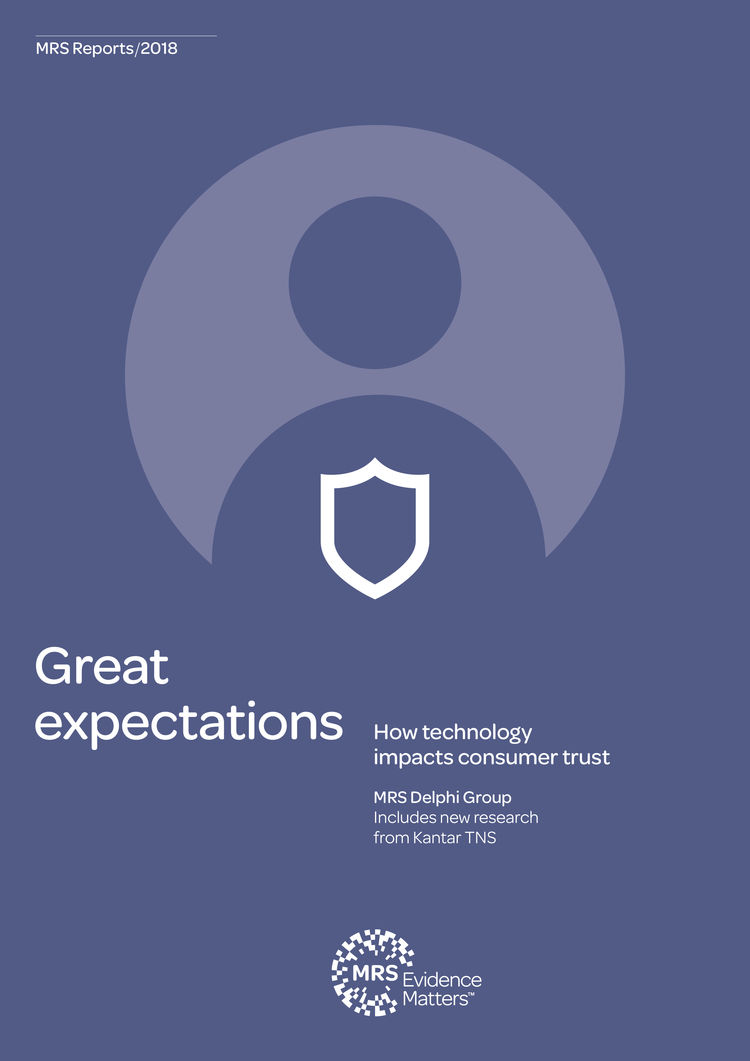New MRS report on technology and trust
Download the report 'Great expectations: how technology impacts consumer trust', published by MRS Delphi Group with new research from Kantar TNS.
The MRS Delphi Group – an MRS think tank led by a collection of the most respected thinkers in the marketing and research sectors – today launched a new report investigating how technology is affecting consumer trust in brands.
The full report is available here: https://www.mrs.org.uk/greatexpectations
In recent years several high-profile data breaches and subsequent cover-ups have encouraged a negative perception of technology, putting businesses under increasing scrutiny when it comes to how they are collecting, storing and using their customers’ data. Now new research from Kantar TNS and Lightspeed Research has found that data security is the most influential factor when determining consumer trust – a significant shift from a time when providing dependable service was enough to secure loyalty.
Great Expectations: How technology impacts consumer trust identifies the main drivers of trust across key sectors – telecoms, banks, retailers, fashion retail, media, transport and pubic services – as well as examining the perceived trustworthiness of high-profile brands and organisations.
The report uses this insight to create a hierarchy of trust, ordering consumer expectations – covering issues of transparency, control, relevance, security and fulfilment – from most influential in determining trust to least. At the top of the hierarchy, as the factor with the most influence, was consumers’ expectation that their ‘information is completely secure’ while assurance that ‘my participation will never put me at personal risk’ was also one of the top five drivers.
Consumer expectation that companies ‘provide a dependable service’ and ‘always offer high standards of customer service’ rank second and third within the hierarchy – suggesting that consistency and efficiency continue to play a role in brand perception. Lloyds Banking Group, Nationwide, BT, Tesco, John Lewis, Amazon and the NHS are among the strongest performers in this area.
The report outlines ways that businesses could be using technology to improve customer service and generate positive long-term relationships with consumers. Key recommendations include using virtual agents (chatbots) alongside human representatives, better integration of digital channels and faster communication with customers.
The findings indicate that the need for transparency around data security is only going to increase, not just due to the impact of the General Data Protection Regulation (GDPR) but also because attitudes towards data vary across generations. While millennials have a greater acceptance of their data being collected they also have a better understanding of the risks involved and are more concerned about being taken advantage of and put at personal risk. The research shows this younger group are more likely to hold brands accountable for sloppy data handling.
The report also draws on case studies from several organisations for whom trust is particularly important and concludes with a 12-step programme that brands and businesses can follow in order to build trust.
Phil Sutcliffe, director of offer and innovation at Kantar TNS, said: “It’s clear that three things are crucial for brands. First, that providing guarantees on data security is paramount. Second, that transparency about how data is being used is important to reassure people that they are not being taken advantage of, or worse, put at risk. Third, that providing utility remains critical for brands to build enduring, trusted relationships. There is commercial advantage to be found if brands can use technology and the data it generates to improve the quality of goods and services.”
Jane Frost CBE, chief executive officer of Market Research Society (MRS) comments: “There are already examples of brands using technology to enhance loyalty – Amazon received the highest average marks across all of our consumer trust expectations. This is because users don’t feel the rub when personalisation kicks in, the data exchange is frictionless and results in an efficient service that customers can rely on – making it worth it. There are endless opportunities here for brands, but also substantial risks when they get it wrong.
“Investment in technology should be strategic and long term and – in these times of marginal competitive advantage – getting data security right is now the cost of doing business.”

Download the report 'Great expectations: how technology impacts consumer trust', published by MRS Delphi Group with new research from Kantar TNS.


Our newsletters cover the latest MRS events, policy updates and research news.